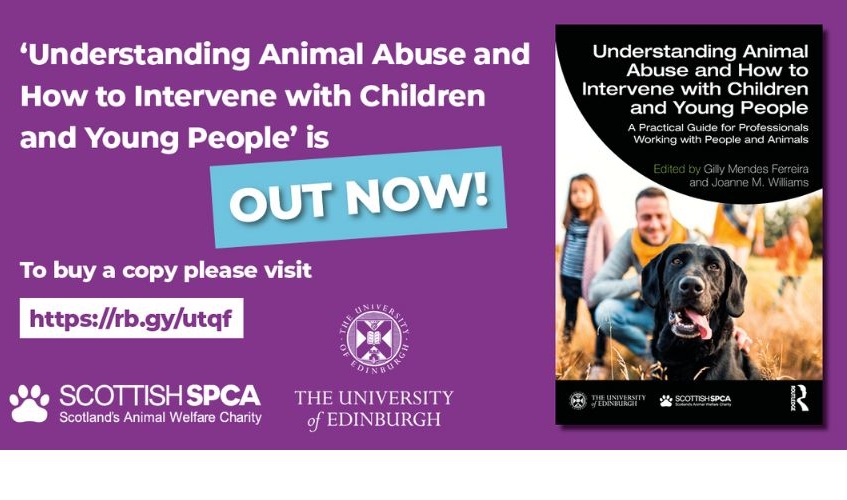Children and young people may harm animals for a variety of reasons and as a Society we need to recognise the early indicators and provide that vital support that is required. Research shows children exposed to animal abuse were five times more likely to have ‘severe problems’ and three times more likely to be ‘struggling’ compared to their more resilient peers.
In response, we have has also renewed calls for animal welfare to be a core part of Scotland’s national education curriculum. They have also launched a joint initiative with the University of Edinburgh to give professionals working with people and animals a toolkit to help them understand, prevent and intervene in cases of animal abuse.
Understanding Animal Abuse and How to Intervene with Children and Young People: A Practical Guide for Professionals Working with People and Animals will give professionals in roles supporting a young person or child who has been involved in animal abuse, the knowledge of services that are available in their area to help safeguard the welfare of both humans and animals.
We offer a free education programme, Animal WISE, which reached over 80,000 young people in 2022. The charity also runs Animal Guardians, a free, pioneering programme for young people who are showing behaviours towards animals that are a cause of concern. Over the past few years, Animal Guardians has had over 300 referrals. On the programme, young people get one-to-one support to understand animal needs and sentience and learn about how to interact safely and responsibly with animals that they come into contact with. The ultimate aim being to encourage positive human-animal interactions as they progress into adulthood. In the late 1990s, we pioneered First Strike, a campaign which highlighted the evidence-based link between animal abuse and violence towards humans.
With contributions from experts in the field, the book offers a definition of animal abuse, the latest research on children, young people and animal abuse, explores the link between concerning behaviours towards animals and other forms of abuse and outlines legal perspectives on this societal issue.
One of the authors of the book, Scottish SPCA Director of Innovation & Strategic Relations, Gilly Mendes Ferreira said: “In recent years, we have established a worrying trend in young people being more exposed to animal abuse. This, combined with new research showing the devastating long-term impact such experiences can have, mean intervening to prevent abuse and educating people on animal welfare is critically important.” Evaluation of our Animal Guardians programme has demonstrated that those who take part show significant improvements in knowledge, belief that animals have feelings and empathy.
“Through Animal WISE and First Strike, we know abuse of animals is linked to a host of serious and violent behaviours. Those who abuse animals may go on to harm people if no intervention takes place, and we are determined to break that link.
“Understanding Animal Abuse and How to Intervene with Children and Young People: A Practical Guide for Professionals Working with People and Animals demonstrates that there is a link between animal abuse and human abuse and I would encourage all professionals working with in particular children and young people but also adults and animals to read it. The book provides a valuable toolkit to recognise signs of abuse and what can be done about it.
“Most importantly the book encourages professionals to get to know who their local support team would be if they came across a case that involved both animal and human abuse. Even if they are not sure whether what they have observed or heard needs looked into, our message would be always speak up, speak to someone you trust and seek that advice.
“Everyone has a role to play including teachers, vets, social workers, parents and carers, and psychologists in reporting animal abuse and seeking support for the individuals involved.”
Co-author Professor Jo Williams, Director of the Centre for Applied Developmental Psychology at the University of Edinburgh said: “There are many factors involved in cases of animal abuse, and sometimes it is difficult to know what to do or who to turn to when you come across a young person harming an animal. This book synthesises international research evidence on child and adolescent animal abuse, and provides a guide for professionals to prevent and intervene in cases of animal abuse. Throughout the book, we present the evidence in non-stigmatising and trauma-informed ways, forming a user-friendly guide to support professionals working with those who are at risk of harming animals, and to protect the animals involved. It provides a wealth of information about how a range of professional groups can play different roles in preventing and intervening in cases of animal abuse.
“The aim is to share this knowledge with a range of professional groups, from teachers to vets, and provide step-by-step guides about what they can do in their professional practice to prevent and intervene in cases of animal abuse. It also provides a toolkit for those who are developing animal abuse prevention interventions to support them in integrating evaluation methods into their programmes to ensure that their interventions work for both people and animals.”
Understanding Animal Abuse and How to Intervene with Children and Young People: A Practical Guide for Professionals Working with People and Animals is available to purchase now on Amazon or here: http://bit.ly/3Gcwbal
Sign our Petition
If you are one of the many people in Scotland who thinks young people should learn about animal welfare in school, then sign our petition and back our campaign. Together, we can protect young people and animals and break the link. https://www.scottishspca.org/break-the-link
Free webinars
Join our free Q&A webinars on Wednesday, 26 April and Wednesday, 3 May. Book here


